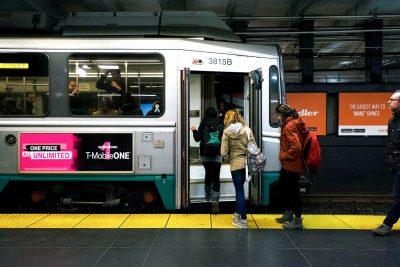
Boston has the second best public transportation system in the U.S., according to WalletHub, a financial advice and news website. Seattle took first overall, while San Francisco came in third.
The rankings, which were released on Tuesday, evaluated 100 different public transportation systems across the country and compared them based on three main categories: accessibility and convenience, safety and reliability, and public transit resources, according to the rankings.
Using 17 different metrics, WalletHub wrote that they graded cities on a 100-point scale, with the overall score being compiled from how well the public transportation system did on each metric.
The Massachusetts Bay Transportation Authority scored an overall score of 77.84, coming just after Seattle’s score of 77.97, according the rankings. WalletHub’s analysis focused solely on public transit within the City of Boston.
On the other end of the scale, the cities of Indianapolis and St. Petersburg, Florida ranked first and second worst overall, receiving a total score of 21.13 and 24.03, respectively.
The MBTA also did well in each individual category, ranking second in the country for accessibility and convenience, 34th for safety and reliability and 10th for public transit resources, according to the rankings.
San Francisco ranked first in the U.S. for accessibility and convenience, while Gilbert, Arizona ranked last. As for safety and reliability, Madison, Wisconsin and Omaha, Nebraska tied for first, with Indianapolis in last place. Finally, Reno, Nevada took the top rank in public transit resources while New Orleans, Louisiana scored last.
MBTA spokesperson Lisa Battiston wrote in an email that the MBTA has been constantly working to improve its service and invest time and money into improving its subway and bus lines.
“With a laser focus on successfully executing its $8 billion capital investment program,” Battiston wrote, “the MBTA is working around the clock to make the major improvements necessary to consistently maintain reliable and safe service to 1.3 million daily T riders.”
Kathryn Carlson, director of transportation at A Better City, a coalition of 130 companies that advocates in the transportation, infrastructure, land use, energy and environmental sectors, said she was not surprised that the MBTA ranked so high in the rankings.
“We are incredibly lucky to have the extensive legacy system that we have,” Carlson said. “When you think about it, the reach of our system, because we started over 100 years ago building this, is much wider, faster than other cities.”
Carlson said that past research conducted by A Better City has shown, despite the problems that plague Boston’s public transit system, investing in improving the MBTA is still worth it for Boston’s residents.
“We calculated that our MBTA, even with the problems it has from under investment in so many years, still provides a five time return on investment for every dollar we put into it,” Carlson said. “So when you think of its reach, how many people it serves, [and] the return on investment it does provide, it’s not surprising.”
As for how the MBTA can continue to improve, Carlson said Massachusetts needed to be willing to invest more money into its public transit infrastructure because the state’s current plans will take at least another ten years before the MBTA becomes a “decent 21st century system.”
“When when we look at the return on investment, let’s not be scared of these big numbers,” Carlson said. “We are, overall, a well off state that should invest in ensuring that all citizens have access to housing and jobs that a transportation system can provide them.”
Evan Chuilli, 25, of Allston, said he was not surprised with how the MBTA did in the rankings.
“I would agree with second best, there’s a lot of issues with our public transportation, issues with delays and functionality,” Chuilli said. “But for what it is, which is one of the oldest transportation systems in the country, I feel like it’s being maintained to the best of Boston’s abilities.”
Brighton resident Mary McLoughlin, 26, said that she did not expect the MBTA to rank so highly, as she has many friends who have taken issue with the MBTA’s reliability.
“A lot of the Red Line stops and trains have been really delayed,” McLoughlin said, “so I know a lot of people who have been really pissed about that.”
Richard Connell, 56, of Fenway, said he was satisfied with how Boston has run, especially the placement of bus and subway stops.
“I think Boston has a great system,” Connell said. “I lived in Chicago, I lived in Stockholm, it’s a great system, between the bus system and the subway, it’s very well thought through.”



















































































































